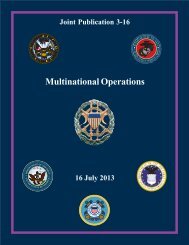ABUSE OF STRUCTURED FINANCIAL PRODUCTS- Misusing Basket Options to Avoid Taxes and Leverage Limits MAJORITY AND MINORITY STAFF REPORT
ABUSE OF STRUCTURED FINANCIAL PRODUCTS- Misusing Basket Options to Avoid Taxes and Leverage Limits MAJORITY AND MINORITY STAFF REPORT
ABUSE OF STRUCTURED FINANCIAL PRODUCTS- Misusing Basket Options to Avoid Taxes and Leverage Limits MAJORITY AND MINORITY STAFF REPORT
Create successful ePaper yourself
Turn your PDF publications into a flip-book with our unique Google optimized e-Paper software.
52<br />
trades were completed if RenTec were merely suggesting rather than executing the trades. It is<br />
also difficult <strong>to</strong> underst<strong>and</strong> how the company offered “suggestions,” since virtually all of the<br />
trade orders were initiated electronically, using RenTec’s proprietary algorithms, <strong>and</strong> were<br />
executed immediately using the banks’ trading software <strong>and</strong> direct market access, typically with<br />
no human intervention on either side.<br />
Bearing the Rewards <strong>and</strong> Risks. Within the MAPS <strong>and</strong> COLT structures, RenTec bore<br />
all of the significant risks <strong>and</strong> rewards due the owner of the securities positions held in the option<br />
accounts. Subject <strong>to</strong> trading <strong>and</strong> financing costs, all of the profits accrued from the trading in<br />
each option account were paid <strong>to</strong> RenTec when the option was exercised. No portion of the<br />
trading profits was paid <strong>to</strong> either bank, which received only financing <strong>and</strong> fee income. In<br />
addition, except for catastrophic market events, RenTec bore all of the risks associated with the<br />
ownership of those assets. For example, any trading losses served <strong>to</strong> lower the value of the<br />
affected option account <strong>and</strong> lower the final option payoff when RenTec exercised the option.<br />
The only risk faced by the banks was a catastrophic market event that depleted the value of the<br />
option accounts, an event that never occurred for any RenTec options. One RenTec analyst<br />
wrote that, even if a threshold level were breached requiring bank assumption of losses in an<br />
option account, losses would be minimal since the portfolio was “well-diversified, marketneutral,<br />
<strong>and</strong> with low liquidity imbalance,” <strong>and</strong> “could be liquidated slowly if required.” 290<br />
Paying Ownership Costs. Further, RenTec bore the day-<strong>to</strong>-day costs associated with<br />
ownership of the assets in the option accounts, even though the assets were held in the name of<br />
the banks providing the accounts. Each option had a “trade confirmation,” which is a written<br />
acknowledgment provided by the bank indicating that a trade has been completed, <strong>and</strong> which<br />
included details such as the date, price, commission, fees, <strong>and</strong> settlement terms of the trade. A<br />
section in the confirmation entitled, “<strong>Basket</strong> Cost” at Barclays <strong>and</strong> “<strong>Basket</strong> Income <strong>and</strong><br />
Expenses” at Deutsche Bank, identified the account expenses <strong>and</strong> subtracted the costs directly<br />
from the account. 291 The costs charged <strong>to</strong> RenTec included trade transaction fees, including<br />
ticket charges <strong>and</strong> short sale borrowing fees, reflecting the costs incurred by the bank for<br />
completing each individual transaction executed in the account. Transaction fees are common<br />
expenses in a traditional client brokerage account, but are normally absent from proprietary<br />
trading accounts operated by the bank itself. 292 Similarly, the trade confirmations charged<br />
RenTec financing fees, which are common in client brokerage accounts, but not in a bank’s own<br />
proprietary trading accounts.<br />
290 Email from Daniel Koranyi, RenTec, replicated in 11/19/2008 email from Colin Masson, RenTec, <strong>to</strong> Daniel<br />
Koranyi, “DB counteroffer,” RT-PSI-00368695-697.<br />
291 For the Barclays confirmations, see, e.g., 12/21/2005 Barclays letter agreement with Badger Holdings L.P.,<br />
“Option HH,” BARCLAYS-PSI-002879-896, at 887-888. For the Deutsche Bank confirmations, see, e.g.,<br />
12/16/2007 Deutsche Bank letter agreement <strong>to</strong> Mosel Equities L.P., “‘OUTPERFORMANCE’ BARRIER OPTION<br />
TRANSACTION—Cash Settled, Linear Amortizing Premium—DB Reference No. 941-50053,” DB-PSI 00000320-<br />
337, at 327.<br />
292 These costs were enumerated in the Barclays confirmations <strong>and</strong> in the Deutsche Bank investment advisory<br />
agreements. See, e.g., 12/21/2005 Barclays letter agreement with Badger Holdings L.P., “Option HH,”<br />
BARCLAYS-PSI-002879-896, at 887-888; 3/14/2002 “Investment Advisory Agreement” between Deutsche Bank,<br />
London Branch, <strong>and</strong> RenTec, DB-PSI 00123209-221, at 210.







